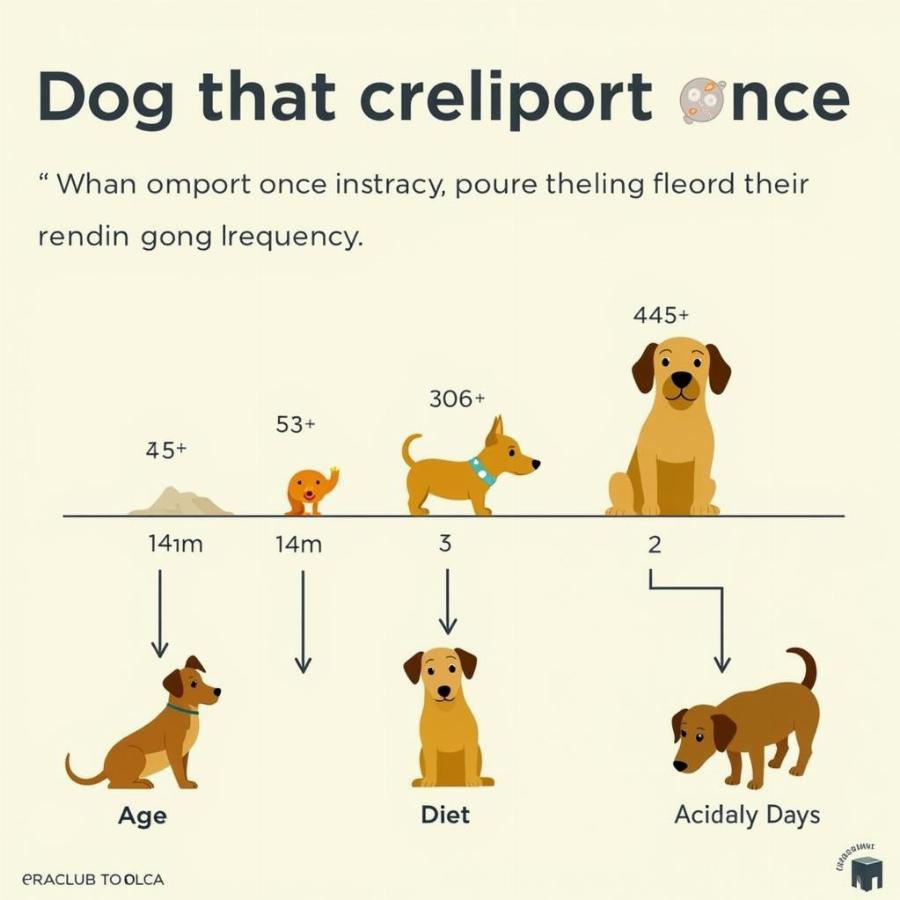Dog poop pile. It’s not a glamorous topic, but as responsible pet owners, understanding our canine companion’s waste is crucial for their health and our environment. From consistency and color to frequency and disposal, this guide will delve into everything you need to know about dog poop piles.
What Your Dog’s Poop is Telling You
A dog poop pile can reveal a lot about your furry friend’s well-being. Consistency, color, and even the presence of foreign objects can offer valuable clues about their diet, digestive health, and potential health issues. So, what should you be looking for?
Consistency: The Ideal Dog Poop
Ideally, a dog’s poop should be firm but not too hard, easy to pick up, and log-shaped. If it’s too soft, watery, or mucus-covered, it could signal dietary indiscretion, parasites, or other underlying health problems. Conversely, excessively hard, pebble-like poop can indicate dehydration.
Color: A Rainbow of Clues
Just like consistency, the color of your dog’s poop can offer important insights. A healthy brown hue is typically a good sign. However, variations in color can indicate different issues:
- Black: Could suggest bleeding in the upper digestive tract.
- Green: May indicate gallbladder issues or excessive grass consumption.
- Yellow: Can be a sign of liver or pancreatic problems.
- Red or Bloody: Points towards bleeding in the lower digestive tract.
- White or Grey: Often associated with pancreatic or biliary issues.
If you notice any unusual or concerning colors, it’s essential to consult your veterinarian immediately.
Frequency: How Often Should Your Dog Poop?
Most dogs poop once or twice a day, but this can vary depending on their age, diet, and activity level. Pay attention to your dog’s usual bowel movement routine. A sudden change in frequency – either an increase or decrease – can be a red flag.
 Dog Pooping Frequency
Dog Pooping Frequency
Responsible Dog Poop Disposal: Protecting Our Environment
Picking up after your dog is not just about keeping our parks and sidewalks clean; it’s about protecting public health and the environment. Dog poop contains harmful bacteria and parasites that can contaminate soil and water sources.
The Do’s and Don’ts of Dog Poop Disposal
- Do: Always carry poop bags with you.
- Do: Pick up your dog’s poop immediately.
- Do: Dispose of the bagged poop in a designated trash receptacle.
- Don’t: Leave dog poop on the ground.
- Don’t: Flush unbagged dog poop down the toilet (unless specifically stated as permissible by your local water authority).
- Don’t: Compost dog poop in a regular compost bin (see composting options below).
Can Dog Poop Be Composted? can dog poop be composted
While you shouldn’t compost dog poop with your regular garden compost, there are specific dog waste composting systems available. These systems create the right conditions to break down the waste safely and effectively. does dog poop make good fertilizer can dog poop be used as fertilizer
When to Worry: Identifying Potential Problems pile of dog poop
While some variations in poop are normal, certain signs warrant a visit to the vet. These include:
- Persistent diarrhea or constipation: fairs in massachusetts that you can bring dogs to
- Blood in the stool:
- Significant changes in frequency or consistency:
- Straining to defecate:
- Loss of appetite or lethargy:
- Vomiting:
Conclusion: The Importance of Monitoring Your Dog’s Poop Pile
Paying attention to your dog’s poop pile may not be the most pleasant task, but it’s a vital part of responsible pet ownership. By understanding what’s normal and what’s not, you can help ensure your furry friend stays healthy and happy. Remember, your dog’s poop can speak volumes about their overall health, so don’t ignore the messages it’s sending!
FAQ
- How often should I check my dog’s poop? Ideally, every time they go! This will help you quickly identify any changes.
- What if my dog eats poop? This is known as coprophagia and can be caused by various factors, including dietary deficiencies or behavioral issues. Consult your veterinarian for advice.
- Can I use baby wipes to clean my dog after they poop? While convenient, some baby wipes contain chemicals that can irritate your dog’s skin. Opt for pet-specific wipes instead.
- What’s the best way to clean up dog poop accidents in the house? Use an enzymatic cleaner specifically designed for pet messes. This will help break down the odor-causing bacteria and prevent future accidents.
- My dog’s poop is really smelly. Is that normal? While some odor is normal, excessively foul-smelling poop can indicate digestive issues.
Beaut Dogs is your trusted source for all things canine. We’re committed to providing expert advice and valuable resources to help you navigate the wonderful world of dog ownership. For personalized guidance and answers to your specific questions, please contact us via email at [email protected]. Beaut Dogs is here to help!